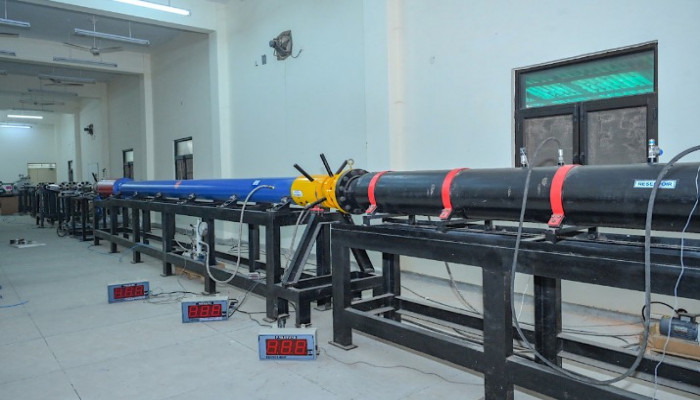IIT Kanpur accomplishes India's first hypervelocity expansion tunnel test facility S2
- In Reports
- 07:42 PM, Feb 05, 2024
- Myind Staff
The Indian Institute of Technology Kanpur has achieved a significant milestone by successfully establishing and testing India’s first Hypervelocity Expansion Tunnel Test Facility. This accomplishment places India in an elite group of nations possessing advanced hypersonic testing capabilities.
The facility, designated as S2, has the capability to simulate flight speeds ranging from 3 to 10 kilometers per second. It replicates hypersonic conditions experienced during the atmospheric entry of vehicles, asteroid entry, scramjet flights, and ballistic missiles.
This makes S2 a crucial testing facility for ongoing missions led by ISRO and DRDO, encompassing projects such as Gaganyaan, Reusable Launch Vehicle (RLV), and hypersonic cruise missiles.
The S2, also known as 'Jigarthanda,' stands as a 24-meter-long facility situated at the Hypersonic Experimental Aerodynamics Laboratory (HEAL) within the Department of Aerospace Engineering at IIT Kanpur.
Over a span of three years, the S2 was meticulously designed and developed indigenously. The project received funding and support from the Aeronautical Research and Development Board (ARDB), the Department of Science and Technology (DST), and IIT Kanpur.
Hypersonic missiles, known for their challenging interception, gain a unique advantage due to their exceptionally high speed, making radar evasion possible. Over the years, two categories of hypersonic missiles have been developed hypersonic cruise missiles and hypersonic glide vehicles.
The introduction of this innovative facility is expected to elevate India's testing capabilities significantly. In a notable achievement in 2020, the DRDO conducted tests on a hypersonic air-breathing scramjet system for propulsion, achieving a remarkable speed of Mach 6 for duration of 23 seconds during the testing phase.
Expressing pride in this significant accomplishment, Professor S. Ganesh, the Director of IIT Kanpur, highlighted the historic nature of the achievement, stating, "The successful establishment of S2 marks a pivotal milestone for IIT Kanpur and reflects India's enhanced scientific capabilities." He commended Professor Mohammed Ibrahim Sugarno and his team for their outstanding efforts in designing and constructing the hypersonic research infrastructure.
The operational success of S2 stands as a testament to India's expanding self-reliance in defense and space technology.
Professor Sugarno, an Associate Professor at the Department of Aerospace Engineering and the Centre for Lasers & Photonics, offered insights into the challenges encountered during the development of S2. He specifically highlighted the intricate nature of the 'free piston driver' system, a critical component that demanded precise engineering and a profound understanding of physics to achieve perfection.
India, equipped with its indigenous hypervelocity testing capability, is set to advance significantly in the development of state-of-the-art hypersonic technologies and systems. This achievement positions the country to strengthen its standing in global aerospace research and enhance its readiness in defense capabilities.
Image source: The Statesman







Comments